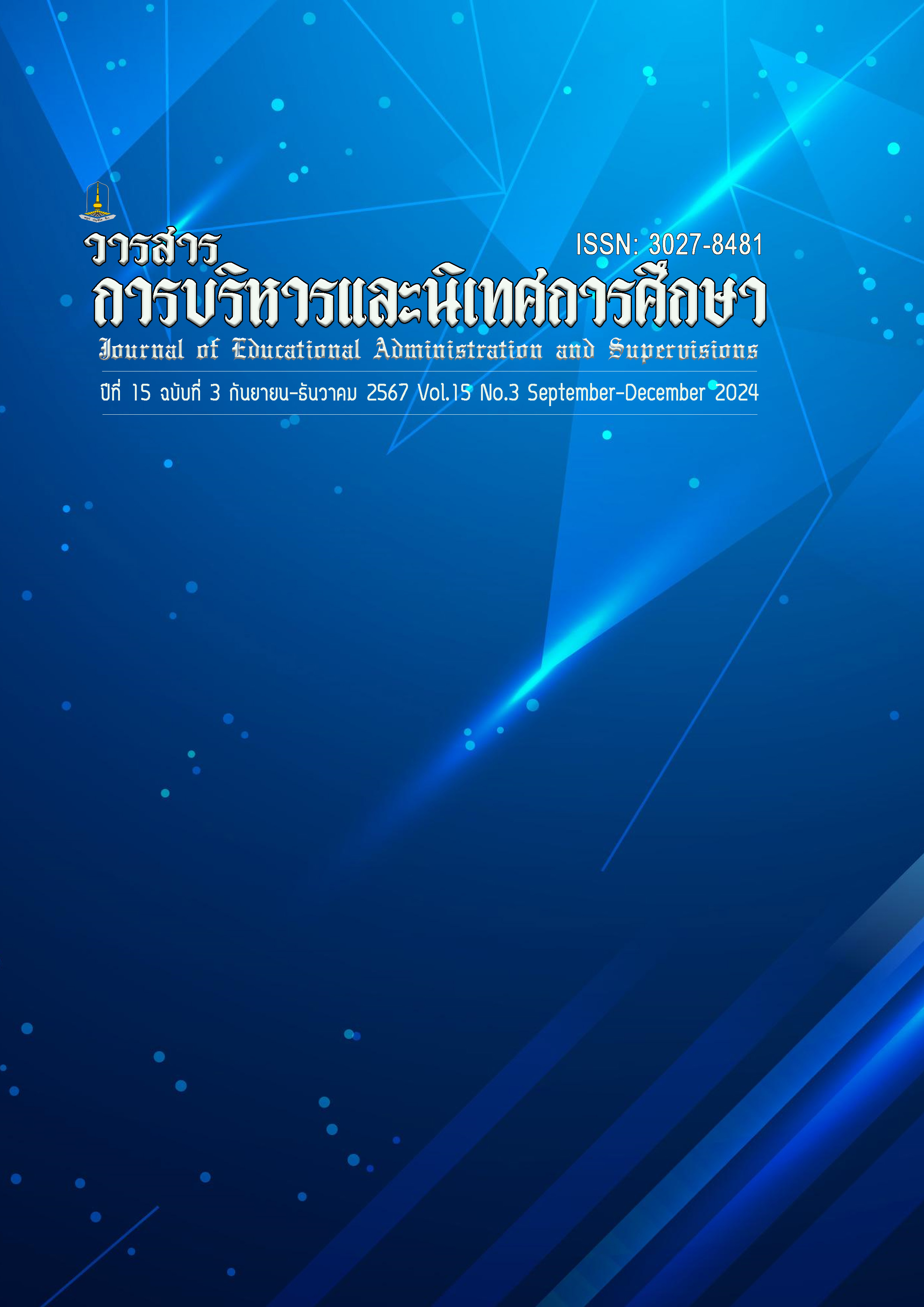A Discriminant Analysis of Competency Perception Based on the TPACK Framework Affecting the Admission of Teacher Students through TCAS : A Case Study of Buriram Rajabhat University
Main Article Content
Abstract
The objectives of this research were to 1) study the perception of competency of student teachers, 2) analyze and classify the perception of competency of student teachers, and 3) create an equation to classify the perception of competency of student teachers in terms of knowledge integration according to the concept framework of TPAC that affects admission through the TCAS system. The sample group is 110 fifth-year undergraduate students in the academic year 2024. The sample size was proportions and Cluster random sampling and use the field of study as the unit for randomization. After that, they are classified into 2 groups: students who enter through the TCAS system. Round 1 Portfolio of 60 people and Round 2 Direct Reception of 50 people, the tool used is a 5-level estimation scale questionnaire with a confidence value of .925. The statistics used were mean, standard deviation, and step-by-step discriminant analysis. 1) The perception of the ability of teacher students in knowledge integration according to the TPAC conceptual framework is at a high level. Technology Knowledge Integrated with Teacher Knowledge and Content Knowledge (TPACK), Technology Knowledge Integrated with Teacher Knowledge (TPK) and Technology Knowledge Integrated with Content Knowledge (TCK). The analysis showed that all 4 variables were important variables in the classification of the group (Wilks'Lambda = .793 ,p < .05). The group can be classified correctly by 77.50 percent, of which knowledge in content (CK) has the highest weight in classification (.594). 3) The classification equation in the form of raw score and standard score is as follows
Forecast equation in the form of raw score
Y = -6.250 + 1.297CK -1.172TCK +.612TPK + .869TPACK
Forecast equation in the form of a standard score
Zy = .594CK -.580TCK +.483TPK +.537TPACK
Downloads
Article Details
References
คณะครุศาสตร์ มหาวิทยาลัยราชภัฏบุรีรัมย์. (2567, พฤษภาคม). รายงานการประชุมคณะครุศาสตร์ มหาวิทยาลัยราชภัฏบุรีรัมย์. มหาวิทยาลัยราชภัฏบุรีรัมย์.
บุญชม ศรีสะอาด. (2560). การวิจัยเบื้องต้น (พิมพ์ครั้งที่ 9). สุริยาสาส์น.
ทรงศักดิ์ ภูสีอ่อน. (2561). การใช้โปรแกรม SPSS ในการวิเคราะห์ข้อมูลทางสถิติ. ตักศิลาการพิมพ์.
ระบบการคัดเลือกกลางบุคคลเข้าศึกษาในสถาบันอุดมศึกษา (TCAS). (2566). https://www.mytcas.com/
รายงานประจำปี 2566: ภารกิจและการพัฒนาบุคลากรทางการศึกษา. (2566). มหาวิทยาลัยราชภัฏบุรีรัมย์.
ลิลลา อดุลยศาสน์ และสุภา ยธิกุล. (2561). การวัดระดับ TPACK (Technological Pedagogical and Content Knowledge) และศึกษาปัจจัยที่ส่งผลกระทบต่อระดับ TPACK ของครูคณิตศาสตร์ใน 3 จังหวัดชายแดนภาคใต้ (รายงานผลการวิจัย). มหาวิทยาลัยราชภัฏยะลา.
สำนักงานคณะกรรมการการอุดมศึกษา. (2560). แผนยุทธศาสตร์มหาวิทยาลัยราชภัฏเพื่อการพัฒนาท้องถิ่น ระยะ 20 ปี (พ.ศ. 2560-2579). https://plan.bru.ac.th
สำนักงานเลขาธิการสภาการศึกษา. (2560). แผนการศึกษาแห่งชาติ พ.ศ. 2560-2579. พริกหวานกราฟฟิค.
สำนักงานเลขาธิการสภาการศึกษา. (2566). การพัฒนาคุณภาพการศึกษาและการเพิ่มขีดความสามารถในการแข่งขันของประเทศ. สำนักงานเลขาธิการสภาการศึกษา.
อนุวัติ คูณแก้ว. (2566). การเลือกใช้สถิติพื้นฐานและสถิติขั้นสูงสำหรับการวิจัย การทดสอบข้อตกลงเบื้องต้นการวิเคราะห์ข้อมูลและการนำเสนอผลลัพธ์. สำนักพิมพ์จุฬาลงกรณ์มหาวิทยาลัย.
Angeli, C., & Valanides, N. (2009). Epistemological and methodological issues for the conceptualization, development, and assessment of ICT–TPCK: Advances in technological pedagogical content knowledge (TPCK). Computers & Education, 52(1), 154-168. https://doi.org/10.1016/j.compedu.2008.07.006
Ball, D. L., Thames, M. H., & Phelps, G. (2008). Content knowledge for teaching: What makes it special. Journal of Teacher Education, 59(5), 389-407. http://dx.doi.org/10.1177/0022487108324554
Chai, C. S., Koh, J. H. L., & Tsai, C. C. (2013). A review of technological pedagogical content knowledge. Educational Technology & Society, 16(2), 31-51. https://www.jstor.org/stable/jeductechsoci.16.2.31
Depaepe, F., Verschaffel, L., & Kelchtermans, G. (2015). Pedagogical content knowledge: A systematic review of the way in which the concept has pervaded mathematics educational research. Teaching and Teacher Education, 49, 12-23. https://doi.org/10.1016/j.tate.2013.03.001
Hair, J. F., Black, W. C., Babin, B. J., & Anderson, R. E. (2023). Multivariate data analysis (9th ed.). Cengage Learning.
Herring, M. C., Koehler, M. J., & Mishra, P. (Eds.). (2016). Handbook of technological pedagogical content knowledge (TPACK) for educators. Routledge.
Kleickmann, T., Richter, D., Kunter, M., Elsner, J., Besser, M., Krauss, S., & Baumert, J. (2013). Teachers' content knowledge and pedagogical content knowledge: The role of structural differences in teacher education. Journal of Teacher Education, 64(1), 90-106. https://doi.org/10.1177/0022487112460398
Koehler, M. J., Mishra, P., & Cain, W. (2020). What is technological pedagogical content knowledge (TPACK)? Journal of Education, 193(3), 13-19. https://doi.org/10.1177/0022057420964796
Koehler, M. J., & Mishra, P. (2009). What is technological pedagogical content knowledge? Contemporary Issues in Technology and Teacher Education, 9(1), 60-70. https://www.learntechlib.org/primary/p/29544/
Koh, J. H. L., & Chai, C. S. (2014). Teacher clusters and their perceptions of technological pedagogical content knowledge (TPACK) development through ICT lesson design. Computers & Education, 70, 222-232. https://doi.org/10.1016/j.compedu.2013.08.017
Mishra, P., & Koehler, M. J. (2020). Technological pedagogical content knowledge (TPACK): Theoretical foundations and practical applications. Educational Technology Research and Development, 68(3), 543-552. https://doi.org/10.1080/15391523.2009.10782544
Mishra, P. (2019). Considering contextual knowledge: The TPACK framework and teacher knowledge. Educational Technology Research and Development, 67(1), 19-36. https://doi.org/10.1080/21532974.2019.1588 611
Mishra, P., & Koehler, M. J. (2013). A review of technological pedagogical content knowledge. Educational Technology & Society, 16(2), 31-51. https://www.researchgate.net/publication/290044779
Mishra, P., & Koehler, M. J. (2006). Technological pedagogical content knowledge: A framework for teacher knowledge. Teachers College Record, 108(6), 1017-1054. https://doi.org/10.1111/j.1467-9620.2006.00684.x
Mouza, C., Karchmer-Klein, R., Nandakumar, R., Ozden, S. Y., & Hu, L. (2014). Investigating the impact of an integrated approach to the development of preservice teachers' technological pedagogical content knowledge (TPACK). Computers & Education, 71, 206-221. https://doi.org/10.1016/j.compedu.2013.09.020
Niess, M. L. (2005). Preparing teachers to teach science and mathematics with technology: Developing a technology pedagogical content knowledge. Teaching and Teacher Education, 21(5), 509-523. https://doi.org/10.1016/j.tate.2005.03.006
Teo, T. (2022). A model for understanding teachers’ intention to use technology for teaching and learning. Computers & Education, 177, 104372. http://dx.doi.org/10.1016/j.compedu.2011.06.008
Tondeur, J., Scherer, R., Siddiq, F., & Baran, E. (2017). A comprehensive investigation of TPACK within pre-service teachers' ICT profiles: Mind the gap! Australasian Journal of Educational Technology, 33(3), 46-60. https://www.researchgate.net/publication/318677637
Voogt, J., Fisser, P., Pareja Roblin, N., Tondeur, J., & van Braak, J. (2013). Technological pedagogical content knowledge–a review of the literature. Journal of Computer Assisted Learning, 29(2), 109-121. https://www.researchgate.net/publication/235733342


